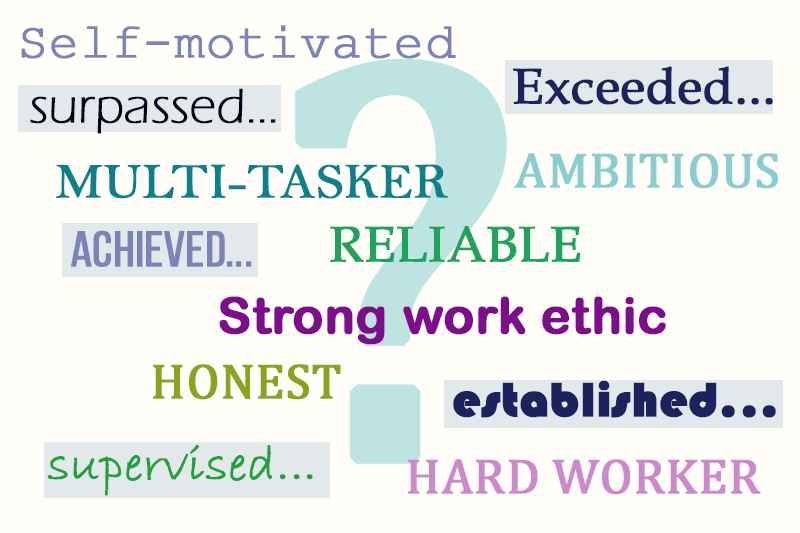We all know that a positive approach to your words and phrases will be a far better way to write a CV. But which words sound more positive than others? Should you use more cliché words and statements? Are buzzwords a good idea?
Having the right balance of keywords, cliché statements and buzzwords could make or break your chances of getting an interview. Avoiding anything self-deprecating is a must, but being over confident to the point of arrogance is just as bad.
To help you decide which words will better describe your abilities, here are the best words to use on your CV or résumé – along with a few tips on which ones to avoid:
Words to avoid on your CV or Résumé
Here are a few examples of words that you should avoid. This is mainly down to the fact that they are a little on the cliché side, and are used so often that employers are getting tired of seeing them:
- Self motivated
- Strong work ethic
- Multi-tasker
- Hard worker
- Ambitious
- Honest
- Reliable
These are just a handful of the most common words used on a CV or résumé, but hopefully you get the idea. With so many applications to read through the hiring manager will get frustrated very quickly if you go down this route too.
The reason why you should avoid these types of words is because they don’t actually add any value to your application. Worst of all, they don’t actually provide any evidence or proof that you are actually a ‘hard worker’ or ‘honest’. You’d naturally be expected to be an honest person, self-motivated, reliable and able to multi-task. If you weren’t, you wouldn’t be a very attractive prospect.
Stating the obvious is not going to get you an interview, so avoid these cliché words and look for a better way to sell your talents.
“The real downside of clichés, apart from putting readers to sleep, is that stale phrases make you sound like everyone else. They make mature, experienced professionals sound like fresh graduates looking for their first role.”
Words you should use on your CV or résumé
Rather than stating you have a strong work ethic, you should instead be more subtle and use words that show this. You may have come across the phrase ‘show, not tell’, which is exactly the way to go when you write your application.
Here are some fantastic words to use instead of ‘strong work ethic’ or to demonstrate your accomplishments:
- Achieved
- Established
- Exceeded
- Supervised
- Surpassed
You can find a more detailed list of action verbs to use on our article, 5 skills every employer expects to see on your CV under the heading ‘Organisation and time management’.
By using these types of words you are forcing yourself to backup your talents with actual examples. You cannot make bold statements and expect the employer to believe you. Instead, you should provide examples, scenarios, numbers and stats, and anything else that would demonstrate your abilities.
Let’s look at the two statements below and decide which one is the best to use:
I have a strong work ethic.
My consistent efforts during the second quarter of 2018 enabled me to surpass my sales figures for the first quarter. I achieved an increase in turnover of £35,000 and sold 5 more units.
You can clearly see which statement is better, and not just a small improvement but a huge one! Not only are you avoiding using a cliché phrase or word, you are instead demonstrating your strong work ethic by providing the increase in turnover and units sold.
So rather than tell the employer how great you are, you can show them. This is explained further in a great video from Beaconpoint:
If you want to know how to show your past performances to an employer, here’s a great article called – How can my CV demonstrate my previous performance?
“Whilst it is certainly acceptable to use a few positive adjectives in your profile and cover letter, it is much better for the employer to come to the conclusion that you are ‘dynamic and motivated’ through what you have achieved.”
~ Gub McNicoll, Managing Director, Consultant
Hunt for keywords
Using action words to demonstrate your achievements will impress any employer. But what will also get you noticed is how well you utilise certain keywords. Where can you find these keywords?
One of the best places to start is the job advert. This will contain a lot of keywords and phrases which you can use in your own application. When the employer reads your CV or résumé they want to instantly see that you tick the right boxes. There will be a set of skills, experience and qualifications that have been requested on the advert, and it’s your job to match those as closely as possible on your application.
It is not a good idea to hide all the relevant information within a generic application and make it hard work for the hiring manager. There are lots of different ways to describe a skill or a job title, so why not just use the same as what you see in the advert? If you are applying for the position of ‘Marketing Manager’ and have previous experience in this role, then make sure the job titles match. If your previous employer called you their ‘Brand champion’ it doesn’t mean to say you have to state that on your application. Further, if the employer is using an ATS to initially read your CV, failure to include the right keywords or using unconventional job titles could lose you an interview.
“Echo the phrasing from the job description on your resume: If the position calls for ‘CRM software,’ your resume must use those exact words. If you list ‘Salesforce,’ an ATS will not recognize that as a match.”
~ James Hu, The Muse
It’s worth generating word cloud using a tool like TagCrowd. This produces a graphic representation of how often certain terms appear. They can help pick out certain words that may be more important to the employer. For example:

Erin Coursey of iHire also recommends you look out for trigger phrases. If you see one of these in the job advert, it may mean there’s an important keyword involved. For example:
- ________ experience or experience with ________
- Background
- Knowledge of ________
- Ability to ________
- Must ________
- Authorised/Certified/Licensed
- Names of industry-specific tools or software
- Action verbs (ex: supervise or build), particularly in the job duties/responsibilities section
Credit: Erin Coursey, iHire
Making a few tweaks to your CV or résumé will make the world of difference. By matching the keywords found on the job advert and through your research and knowledge of the company/industry, you will instantly see a much higher success rate.
In conclusion:

A ‘show rather than tell’ CV or résumé will allow you to use the right words and avoid cliché statements. An employer wants to see evidence of your performance and skill set, and will not take your word for it. And why should they?
Focus upon what the employer is looking for in a candidate to help you shape the wording of your application. If you were applying for a sales role, then your past achievements in a sales environment would be very important to them. If you have a proven track record of achieving a high sales volume and/or hitting your targets, then you should use your application as an opportunity to show off your achievements.

Really interesting, hadn’t really thought too much about specific words before. It’s interesting how those words guide you to including powerful information that demonstrates your abilities.